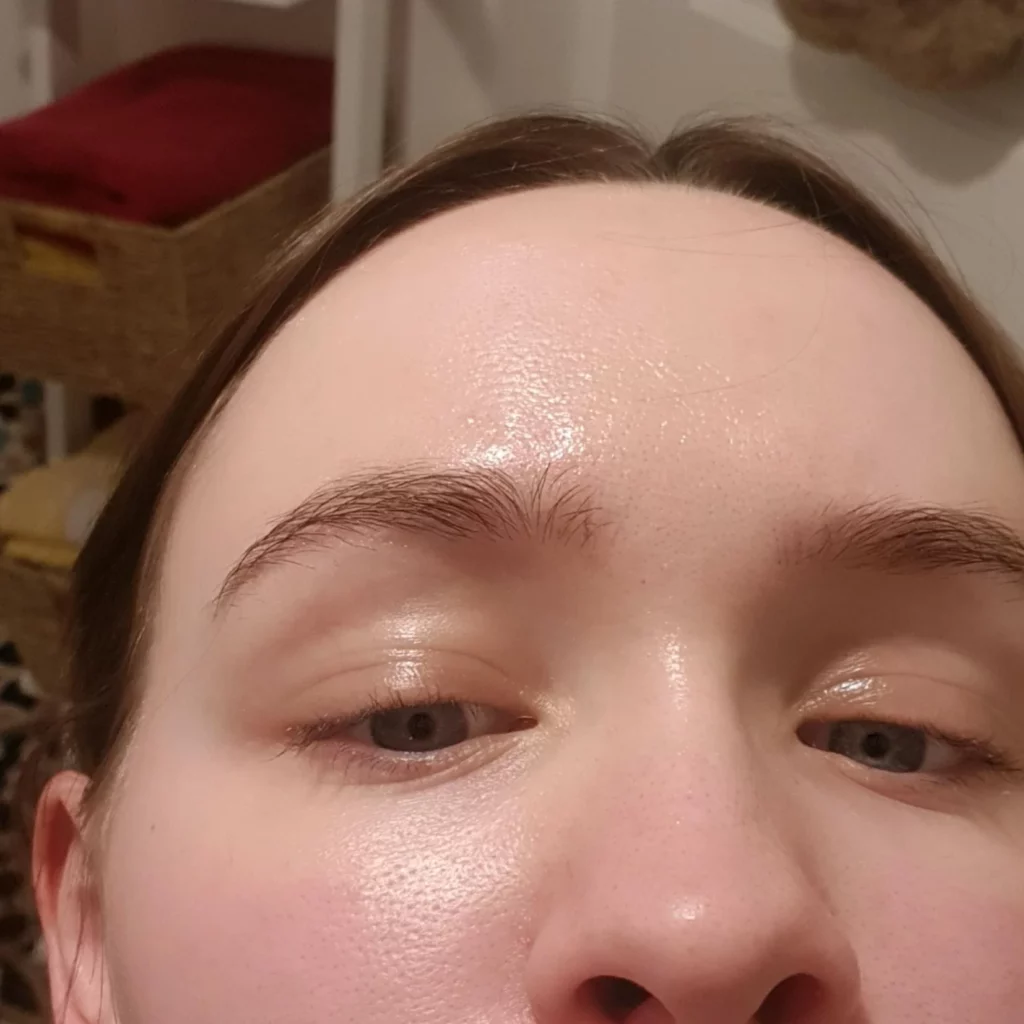Your face is oily when you wake up due to the body’s natural production of sebum during sleep. This can occur because of hormonal changes and the accumulation of oils and bacteria on your skin while sleeping.
Waking up to a greasy face can be frustrating, but understanding the reasons for this can help manage the issue effectively. During sleep, the body’s hormone levels fluctuate, which can lead to increased sebum production. Additionally, as you rest, the oil, bacteria, and dirt from your hair and surroundings can transfer to your skin, contributing to the oily complexion in the morning.
Taking proactive measures like using oil-control skincare products and maintaining a regular cleansing routine can help manage the oiliness and promote a fresher-looking face when you wake up.
Contents
The Science Behind Oily Skin
Sebaceous glands, which are located under the skin, are responsible for the production of sebum, a natural oil that helps to moisturize and protect the skin. These glands are most prevalent on the face, scalp, and upper body.
Sebum plays a crucial role in keeping the skin hydrated and healthy, as it helps to maintain the skin’s protective barrier and prevents it from drying out.
Factors Contributing To Excessive Sebum
Several factors can contribute to an overproduction of sebum, leading to excessively oily skin. Hormonal changes, genetics, diet, and environmental factors can all influence the activity of sebaceous glands and the production of sebum.
Hormonal changes are particularly significant, as increased levels of androgens can stimulate the sebaceous glands to produce more sebum. Diet can also play a role, as consuming high levels of certain fats and sugars can lead to increased sebum production.

Effects Of Oily Skin Upon Waking
If you wake up with oily skin, you’re not alone. Oily skin is a common skin concern that can have a significant impact on your waking experience. Understanding the effects of oily skin upon waking can help you in managing your skincare routine and maintaining a balanced complexion. Let’s delve into the specific effects of oily skin when you first open your eyes in the morning.
Skin Texture And Appearance
Upon waking, individuals with oily skin often notice a greasy sheen on their face. The excess sebum produced by the sebaceous glands can make the skin appear shiny or even slick to the touch. This can lead to a lack of freshness in the morning and may affect individuals’ self-confidence.
Impact On Skincare Routine
Oily skin in the morning can have significant ramifications for a person’s skincare regimen. The excess oil can make it more challenging for skincare products to be fully absorbed into the skin, potentially reducing their effectiveness. Additionally, individuals with oily skin may need to adjust their morning cleansing routine to effectively address the greasy residue and prepare the skin for the day.
Environmental And Lifestyle Influences
When it comes to understanding why your face may be so oily when you wake up, it’s important to consider the environmental and lifestyle influences that can impact oil production in the skin. Factors like diet, hormonal changes, and daily habits can all play a significant role in the excessive oiliness experienced upon waking. Let’s explore these influences in more detail.
Relationship Between Diet And Oily Skin
The food you consume can directly impact the production of oil in your skin. Consuming a diet high in refined carbohydrates and sugars can lead to an increase in insulin levels, which in turn stimulates oil production in the skin.
On the other hand, foods rich in omega-3 fatty acids, such as salmon and avocados, can help regulate oil production and reduce excess oiliness. It’s essential to maintain a balanced diet to promote healthy skin and reduce oiliness.
The Role Of Hormones In Oil Production
Hormonal fluctuations, especially during puberty, menstruation, pregnancy, and menopause, can lead to an increase in oil production. During these times, the body’s hormone levels fluctuate, leading to an overproduction of sebum.
This overproduction can result in oily skin, acne breakouts, and other skin issues. Making lifestyle adjustments and seeking professional guidance can help manage hormonal influences on oil production.
By understanding the impact of diet and hormonal fluctuations on oily skin, you can make informed choices to promote a healthier and less oily complexion.
Effective Morning Skincare Practices
Struggling with oily skin in the morning? Implementing an effective morning skincare routine can help balance your skin’s oil production. Cleansing with a gentle, oil-free cleanser and applying a lightweight moisturizer can help control excess oil and keep your skin looking fresh throughout the day.
Choosing The Right Cleanser
One of the most crucial steps in your morning skincare routine is selecting the right cleanser to begin your day. Opt for a gentle foaming or gel-based cleanser that is specifically formulated for oily or combination skin. Look for ingredients such as salicylic acid or glycolic acid, which can effectively control oil production without over-drying your skin.
Importance Of Hydration And Moisturization
Hydration and moisturization are vital for balancing oily skin. Using a lightweight, oil-free moisturizer can help to replenish your skin’s moisture without adding excess oil. Additionally, incorporating a hydrating serum into your morning routine can provide an extra layer of moisture, keeping your skin soft and supple throughout the day.
Addressing Oily Skin For The Long Term
Waking up to an oily face can be frustrating, but understanding the root cause and implementing a long-term solution can bring relief.
Addressing oily skin for the long term involves creating a tailored skincare regimen as well as consulting with a dermatologist for persistent issues. By taking proactive steps, you can effectively manage and reduce the excess oil production, leading to clearer and healthier skin.
Creating A Tailored Skincare Regimen
Creating a tailored skincare regimen starts with identifying your skin type and choosing products formulated for oily skin. Look for oil-free and non-comedogenic cleansers, moisturizers, and sunscreens to prevent pore blockages. Incorporating exfoliation using salicylic acid or glycolic acid can help remove excess oil and dead skin cells, preventing clogged pores.
- Use a gentle cleanser formulated for oily skin to wash your face twice daily.
- Apply an oil-free moisturizer to keep the skin hydrated without adding extra oil.
- Include a lightweight, non-comedogenic sunscreen to protect your skin from UV damage.
- Utilize exfoliating products containing salicylic acid or glycolic acid to unclog pores and reduce oiliness.
Consulting With A Dermatologist For Persistent Oily Skin
If persistent oily skin continues to be a concern, seeking professional guidance from a dermatologist is crucial. A specialist can assess your skin condition, identify any underlying issues, and recommend targeted treatments. They may suggest prescription-strength topical retinoids or oral medications to regulate oil production and improve skin texture.
- Schedule an appointment with a dermatologist to address persistent oily skin.
- Receive personalized treatment recommendations tailored to your skin’s needs.
- Explore prescription options such as topical retinoids or oral medications for effective oil control.
Conclusion
Understanding the reasons for oily skin in the morning is vital. By following a proper skincare routine and using suitable products, you can effectively manage excess oil. Embracing a healthy lifestyle and diet also impacts skin health. With consistency and patience, you can achieve a balanced and glowing complexion.

